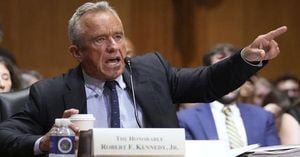Federal workers across the nation are grappling with the Trump administration's offer of deferred resignations, causing significant confusion and concern about its legality and impact on the federal workforce.
Last week, thousands of federal employees received memos from the White House's Office of Personnel Management (OPM) detailing the offer, which enables them to resign by February 6 and continue receiving pay through September 30, 2025. The memo, titled "Fork in the Road," has raised eyebrows among workers who initially questioned whether the email was legitimate, leading OPM to clarify its authenticity.
According to agency officials, the offer is not just valid but is being honored, reassuring employees by stating they can take extended vacations or seek private sector employment without the need to work during this period. This unprecedented move aims to shrink the federal workforce significantly, as the administration continues to push for more employees to return to traditional work settings.
Max Alonzo, the national secretary-treasurer for the National Federation of Federal Employees, cautions against taking the offer, expressing skepticism about its legality. "Absolutely do not resign," Alonzo advises, highlighting the absence of legal backing for ensuring pay over the specified timeline. "There’s nothing saying they have to pay you until September 30. This is not something done before; there are no regulations backing it, and we’re not even sure it’s legal." His union has advised workers to remain cautious and not respond to the resignation offers.
Further complicacies arise due to budget constraints on federal agencies. Many are anticipated to run out of funds by mid-March 2025, as Congress controls the appropriations, and without new funding, the executive branch cannot promise continued pay beyond this date. Donald Kettl, a professor emeritus at the University of Maryland School of Public Policy, stated, "The executive branch cannot legally obligate the government to make payments past March 14. An offer for paid leave after this point is unlawful." This potential financial collapse raises doubts about how the Trump administration can legitimately promise those accepting the buyouts will receive their pay.
The administration has actively sought to clarify the misconceptions surrounding this offer through Frequently Asked Questions (FAQs) shared with employees. For example, the FAQ confirms federal workers are not required to work if they accept the resignation offer. It also states employees can rescind their resignation requests—though under uncertain terms—leading to concerns over job stability among those who might decide to accept the offer.
Concerns have been voiced particularly about the substantial impact such resignations could have on federal services. Everett Kelley, head of the American Federation of Government Employees Union, mentioned, "The offer could lead to vast, unintended consequences, causing chaos for Americans who depend on federal services." With the federal government employing over 3 million people, resignations could disrupt operations across various agencies, critically impacting programs like Social Security, Medicare, and various public service systems.
The skepticism is visible among workforces from notable federal agencies as well, including the TSA and Department of Veterans Affairs, which have either stated their workers are not eligible for buyouts or have expressed severe concerns about job security among their ranks. Mike Gayzagian, president of the Transportation Security Administration's local officers' union, remarked on the concerns for public safety, stating, "It is not clear how this program will affect aviation safety workers." Similar sentiments echoed among correctional workers, reflecting the shared unease across federal departments.
While the administration emphasizes its aim is to minimize the size of the government effectively, critics—including former Labor Secretary Robert Reich—urged federal workers to reject the buyouts, echoing fears about the legality and the potential backlash against the offer. "Don't accept Elon's offer," Reich warned, referencing Elon Musk's comments, which suggested massive savings from federal employee departures, linking it to deep political undertones behind this unprecedented resignation program.
The controversy surrounding the "Fork in the Road" resignation offer shows no signs of abatement as the February 6 deadline approaches. Federal workers continue to ponder the ramifications of this move, weighing their options against uncertain legal and financial landscapes. Without clarity from the administration and Congress, the impact of this initiative on civil service and American public programs remains to be seen.



